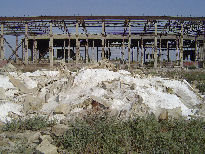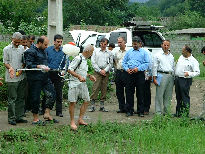| |
Grants >> MSGP-POPs
English | Russian
Matched Small Grants Programme
POPs Pilot Projects
A number of major activities related to the reduction of POPs are implemented under the CEP-SAP project. These include, inter alia a number of pilot projects to reduce POPs use and application. The 4th meeting of the Regional Advisory Group (P-RAG-4) held in Baku in October 2005 recommended CEP-SAP to conduct an “extraordinary” MSGP round for selection of POPs Pilot Projects in all Caspian countries (one in each). Four Caspian countries (except Kazakhstan) submitted applications to CEP PCU in April 2006. In May 2006 these applications were discussed and selected at an Evaluation Committee meeting. The Implementation of 4 pilot projects commenced in Caspian countries in June 2006 (in Turkmenistan – in August). Summaries of the projects are provided below.
 Azerbaijan Azerbaijan
| |
Project title: Clean up of the territory of warehouse base for poison-chemicals of the Salian district and reburying of the POPs. |
| |
Project Summary: Starting from 1947 till 1982 DDT has been intensively used in Azerbaijan for cotton cultivation. In 1989-1991 main quantity of the remains of DDT and other poison chemicals from regional bases has been moved to specially constructed burial ground. However, large base with obsolete poison chemicals was discovered in the Salian district in the course of POPs inventory. The base facilities (warehouses) are destroyed and as a result DDT and other pesticides are being washed out into the Kura river and to the Caspian Sea contaminating surrounding soils and waters."
The Project objectives are as follows:
- To isolate the territory of the base from the environment.
- To remove the remaining DDT and Polydafen from the base to special storehouse.
- To clean up the territory of the base.
- To conduct chemical analysis on the mentioned territory, area of water and deltas of the Kura river and the Caspian Sea in order to monitor the state of pollution.
- To purchase residues of DDT and other POPs from community members and bury them in special storehouse.
- To rise public awareness regarding POPs in communities of the neighboring settlements.
|
| |
Lead Organization: SHAFA-I Ltd |
| |
Address: J.Khandan Snr. 15B, 8th Microrayon, Baku, Azerbaijan |
| |
Project Manager: Mammadbagir Kerimov |
| |
Total project budget, USD: 85,000 (Grant : 42,500; Matching funds: 42,500) |
| |
Duration: nine months. |
| |
Geographical location: Salyan region (100 km from Baku) and Absheron peninsula. |
 I.R. Iran I.R. Iran
| |
Project title: Application of insect sex pheromones and appropriate pesticide application techniques in order to reduce the pesticide residues on rice in paddy fields and the environment in Mazandaran Province. |
| |
Project Summary: About 280000 hectares in Mazandaran province of I.R. Iran are under the rice cultivation, of which about 145000 hectare is sprayed with various pesticides amounting to about 830 tones, including 640 tones of herbicides, 160 tones of fungicides and 30 tones of insecticides annually to protect them against various pests. This amount of pesticide application not only contaminates the rice but also the air, soil and waters in the coastal area finally resulting in pollution of the Caspian Sea.
The overall goal of the project is to reduce the pesticide use with right choice of pesticide applicators and alternative safer chemicals such as insect sex pheromones as pesticide alternatives. This goal is achieved through proper education and training of farmers, which is based on outcome from various research projects performed in the Plant Pests & Diseases Research Institute. The outcome of this project could definitely be disseminated to other countries in the region and therefore reduce the amount of pesticides being used by them.
|
| |
Lead Organization: Biological Control Research Laboratory |
| |
Address: Amol, Mazandaran Province, I. R. Iran |
| |
Project Manager: Dr. Mohsen Morovati |
| |
Total project budget, USD: 90,000 (Grant : 45,000; Matching funds: 45,000) |
| |
Duration: one year. |
| |
Geographical location: Mazandaran Province. |
 Russia Russia
| |
Project title: Development and introduction to technologies and mobile pilot model of the installation for utilization of agricultural pesticides by method of thermal destruction. |
| |
Project Summary: In the Republic of Dagestan 205 tons of obsolete and banned agricultural pesticides of 35 types are kept on open area and in maladjusted storages, which causes threat to health of populations and to environment. 110,8 tons of pesticides are kept right in the Caspian coastal zone where about 1,2 millions people are living.
The main purpose of the project is development and introduction of technologies and mobile pilot model of the installation for utilization of agricultural pesticides by the method of thermal destruction. Upon passing the expertise and certification the prototype installation will be used fore utilization of pesticides in coastal zone of Republic of Dagestan followed by recovering and restoration of lands The realization of the project will have positive effect which concerns border states too, and is directed on decision of the national priority problem, determined in the National Caspian Plan Action in Republic of Dagestan.
|
| |
Lead Organization: The Autonomous nonprofit organization «The institute of social-economic monitoring, strategic studies and development» (ANO «MIR») |
| |
Address: Russia, Republic of Dagestan, 367025, Mahachkala, Batiraya str., 4 «a» |
| |
Project Manager: Guseinov Abdurahman Gadgievich |
| |
Total project budget, USD: 100,000 (Grant : 50,000; Matching funds: 50,000) |
| |
Duration: one year. |
| |
Geographical location: Republic of Dagestan. |
 Turkmenistan Turkmenistan
| |
Project title: Sustainable (POPs-free) development of agricultural activities through the introduction of POPs free technologies of plant protection and training of local farmers. |
| |
Project Summary: The agricultural sector on the Caspian Sea coast is under-developed, so there are plans of the local and regional government on the promoting agriculture development in the region. Because of nation-wide practice of pesticide use there is a threat to make the south-east Caspian coast a hot spot for POPs pollution which will affect existing spawning grounds and Khazar Nature Reserve.
The project goal is the development and promotion of the sustainable agricultural production in the south-east Caspian coast by the use POPs-free technologies in pest control and defoliation. The goal is achieved through creation of pilot fields for training and establishment biological control labs, which would provide the biological pest protection. The training on technological particularities of the POPs-free practices will be conducted for local farmers and specialists from department of agriculture and farmers associations. The large national conference will be organized to promote among the government officials POPs-free practices and signing of Stockholm Convention.
|
| |
Lead Organization: Communal services of Essenguly region, jointly with the Dept of Agriculture of Essenguly regional government |
| |
Address: 34 Balgysyl St, Essenguly, Essenguly Etrap, Balkan velayat, 740052, Turkmenistan |
| |
Project Manager: Amaniyaz Gylyjov |
| |
Total project budget, USD: 89,500 (Grant : 27,440; Matching funds: 62,060) |
| |
Duration: one year. |
| |
Geographical location: Essenguly region, Balkan velayat, Turkmenistan. |
©2009 CaspEcoProject Management and Coordination Unit
7-th floor, Kazhydromet Building, Orynbor st., Astana, 010000, Republic of Kazakhstan,
Tel. No.: (+7 7172) 798317; 798318; 798320, 798307, E-Mail: MSGP.MEG@undp.org
|
